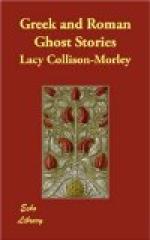The mother is beside herself with grief. Her son’s spirit, which had successfully baffled the gods of the lower world in its desire to visit her, is now, thanks to these foreign spells, dashing itself against the top of the grave, unable to understand the weight that has been placed upon it to keep it from escaping. Not only do the spells shut the boy in—he might possibly have broken through these—but the iron bands and solid fastenings have once again brought him face to face with death. This very realistic, if rather material, picture of a human soul mewed up for ever in the grave gives us a clear idea of the popular belief in Rome about the future life, and enables us to realize the full meaning of the inscription, “Sit tibi terra levis” (May the earth press lightly upon thee), which is so common upon Roman tombs as often to be abbreviated to “S.T.T.L.”
The speech is supposed to be delivered in an action for cruelty[74] brought by the wife against her husband, and in the course of it the father is spoken of as a parricide for what he has done. He defends himself by saying that he took the steps which are the cause of the action for his wife’s peace of mind. To this plea it is answered that the ghost of a son could never frighten a mother, though other spirits, if unknown to her, might conceivably do so.
In the course of the speech we are told that the spirit, when freed from the body, bathes itself in fire and makes for its home among the stars, where other fates await it. Then it remembers the body in which it once dwelt. Hence the dead return to visit those who once were dear to them on earth, and become oracles, and give us timely warnings, and are conscious of the victims we offer them, and welcome the honours paid them at their tombs.
The Declamation ends, like most Roman speeches, with an appeal: in this case to the sorcerer and the husband to remove the spells; especially to the sorcerer, who has power to torture the gods above and the spirits of the dead; who, by the terror of his midnight cries, can move the deepest caves, can shake the very foundations of the earth. “You are able both to call up the spirits that serve you and to act as their cruel and ruthless gaoler. Listen for once to a mother’s prayers, and let them soften your heart.”




